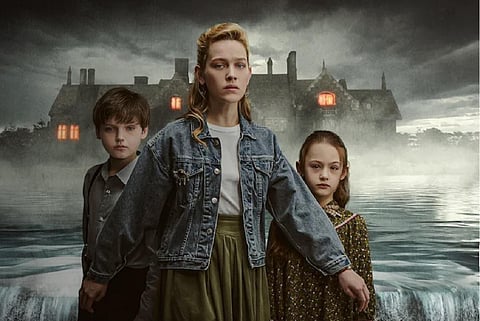

Spoilers ahead
In a lot of mainstream stories that we see in cinema, love tends to be a major driver in the actions of the characters. But there are some stories which are just as powerful because they unravel another emotion that can be as strong a motivator as love, if not more – guilt. And Netflix’s The Haunting of Bly Manor, which released on October 9, is a brilliant exploration of a drama that is driven by several of its characters being haunted by the guilt of their past.
The Haunting of Bly Manor is the second instalment after the riveting Haunting of Hill House, though the two series explore different settings and different stories. Bly Manor, unlike its predecessor which was entirely directed by Mike Flanagan, has episodes directed by others, namely Ciarán Foy, Liam Gavin, Yolanda Ramke and Ben Howling, EL Katz, and Axelle Carolyn. Compared to Hill House, this instalment has arguably fewer scares, but the narration, storytelling, and the intricate web it builds as it delves into the past, relationships, human psyche and trauma is just as good.
That said, what stands out in The Haunting of Bly Manor is its treatment of human guilt. The story revolves around Danielle ‘Dani’ Clayton (played by Victoria Pedretti), who comes to Bly Manor to take care of two young siblings, - Miles (Benjamin Evan Ainsworth) and Flora Wingrave (Amelie Bea Smith) - who have lost their parents in an accident. Dani is hired for this job by Henry Wingrave (Henry Thomas), the children’s father’s younger brother. At Bly Manor, Dani meets with Hannah Grose (T’Nia Miller), the housekeeper; Owen Sharma (Rahul Kohli), the cook; and Jamie (Amelia Eve), the gardener.
As expected, the kids behave strangely, sometimes too grown up for their age, and strange things happen in the massive manor and its lake, which Dani tries to make sense of. While there are several characters who live with guilt, it is Dani and Henry’s stories that perhaps portray it best.
Right off the bat, we know that Dani is a haunted woman. She cannot look at herself, at her own reflection, literally and figuratively, for she sees a shadow of a man with round spectacles that burn like fire behind her every time she comes face to face with a mirror. We learn of her guilt as the story behind the apparition unfolds, and how it has driven her away from her life back in the US to come to Bly in England, and how it continues to drive her as she seeks to keep the children safe, sometimes at much personal risk. We learn how guilt has been an old friend of hers – and how entwined it is with her struggle to come to terms with her sexuality, and a part of herself she has kept tucked away out of fear of disappointing her loved ones. We learn of a tragic loss she suffers when she finally opens up for the first time, how the existing guilts collapses further on her and how heavy is the burden that she carries.
Henry, meanwhile, lives with the guilt of his brother Dominic and his wife Charlotte’s deaths. He blames himself for them leaving the country to rekindle their marriage, due to his actions and his relationship with Charlotte in his brother’s absence. In a particularly powerful scene, we see Dominic finding out about Charlotte and Henry, and banishing his younger brother with the cruellest of words from his home, his family, his life. From the night that Henry learns about his Dominic and Charlotte’s deaths, he becomes haunted by an apparition that looks like him – his guilt manifests into a version of himself of himself that is the monster that Dominic described him to be. The apparition torments him, keeps him from visiting and talking to Flora though the kids miss him too, and there is practically nothing stopping him from seeing them.
There are several other telling moments that show how guilt manifests in our lives and actions, how something that is so intangible, practically invisible, weighs down so heavily on our chests. Dani, for instance, finds herself being pulled towards Jaime. But her fear of giving into her feelings because of the guilt she carries about her last partner is heartbreaking. On the other hand, we see Peter Quint (Oliver Jackson Cohen), who is haunted by his abusive childhood, and his guilt turns into anger as he gets drawn again and again into his own version of hell.
It is almost as though guilt is a protagonist in the film too. Right from the moment where we see the image that haunts Dani in her reflection as well as Henry’s doppelganger demon, these personifications of guilt and shame have their own power, their own voice, their own gravity. While Dani cannot bear to look at herself because of her guilt, Henry finds himself drinking away to numb his pain, while in reality, his intoxication is what arguably keeps the monstrous apparition appearing even more real, and gives it even more power to control him.
The Haunting of Bly Manor makes guilt tangible by giving it a shape and form, by making it visible enough for us to see just how much we carry and hold back when we feel it, and how easy it can appear to let go, but how arduous the journey to forgiving oneself is. And the show imbues these arcs with flawed characters who learn, grow and form complex relationships, making it a beautifully layered watch.
In showing guilt without villainising it and without infantising the characters, The Haunting of Bly Manor gives us a memorable story, going beyond the genre of ‘horror’ to stitch a wholesome narrative which has plenty of love and redemption too.
Watch the trailer of series here.